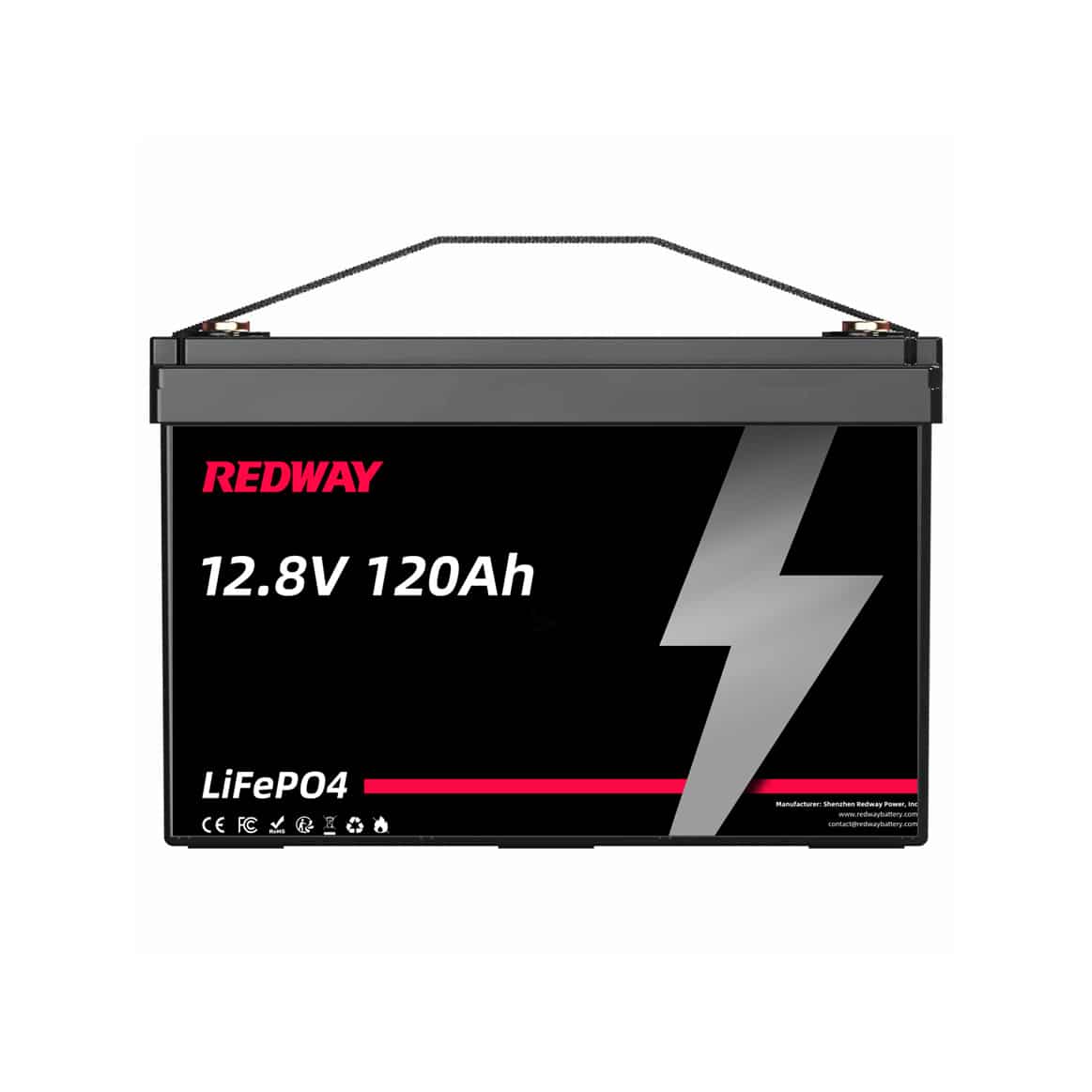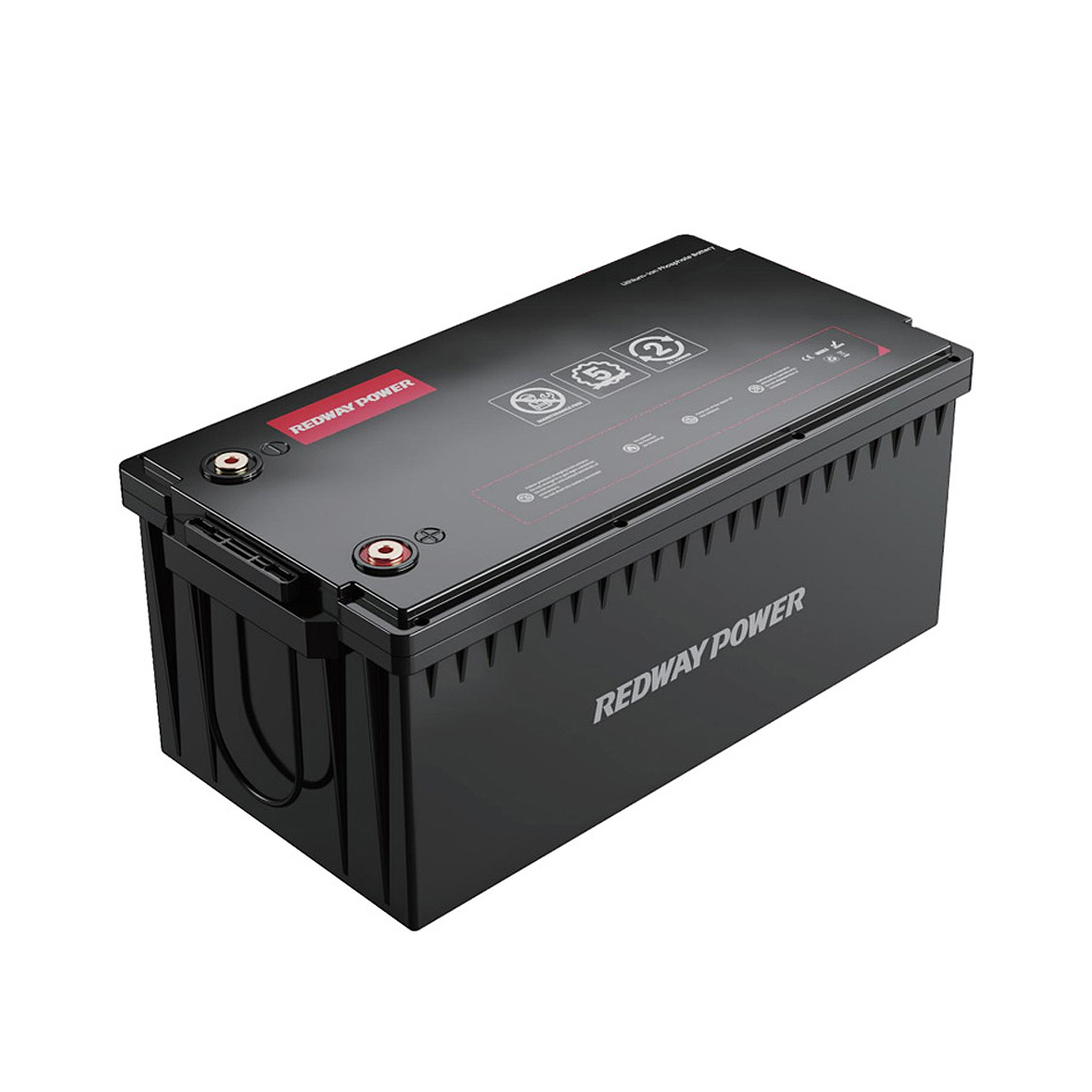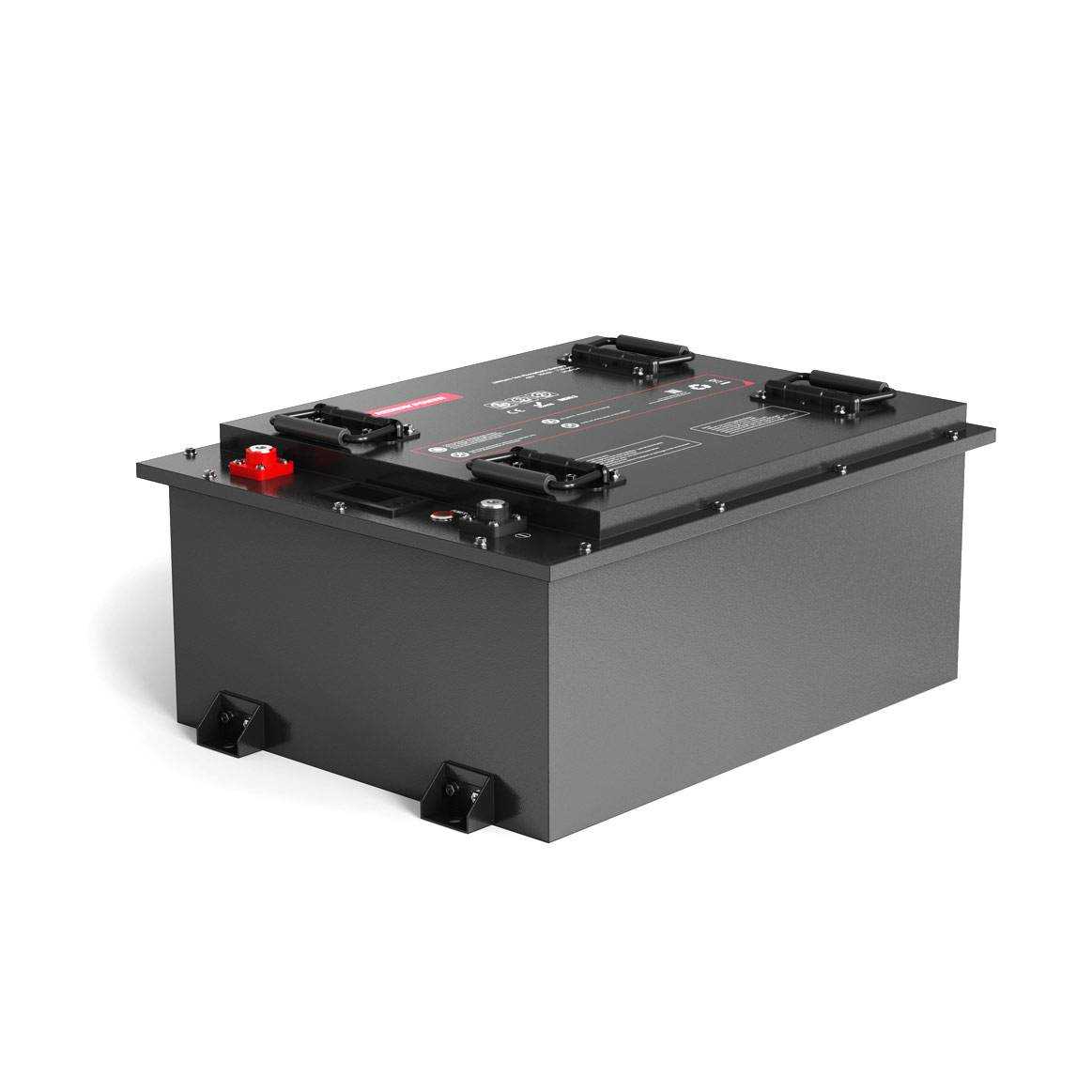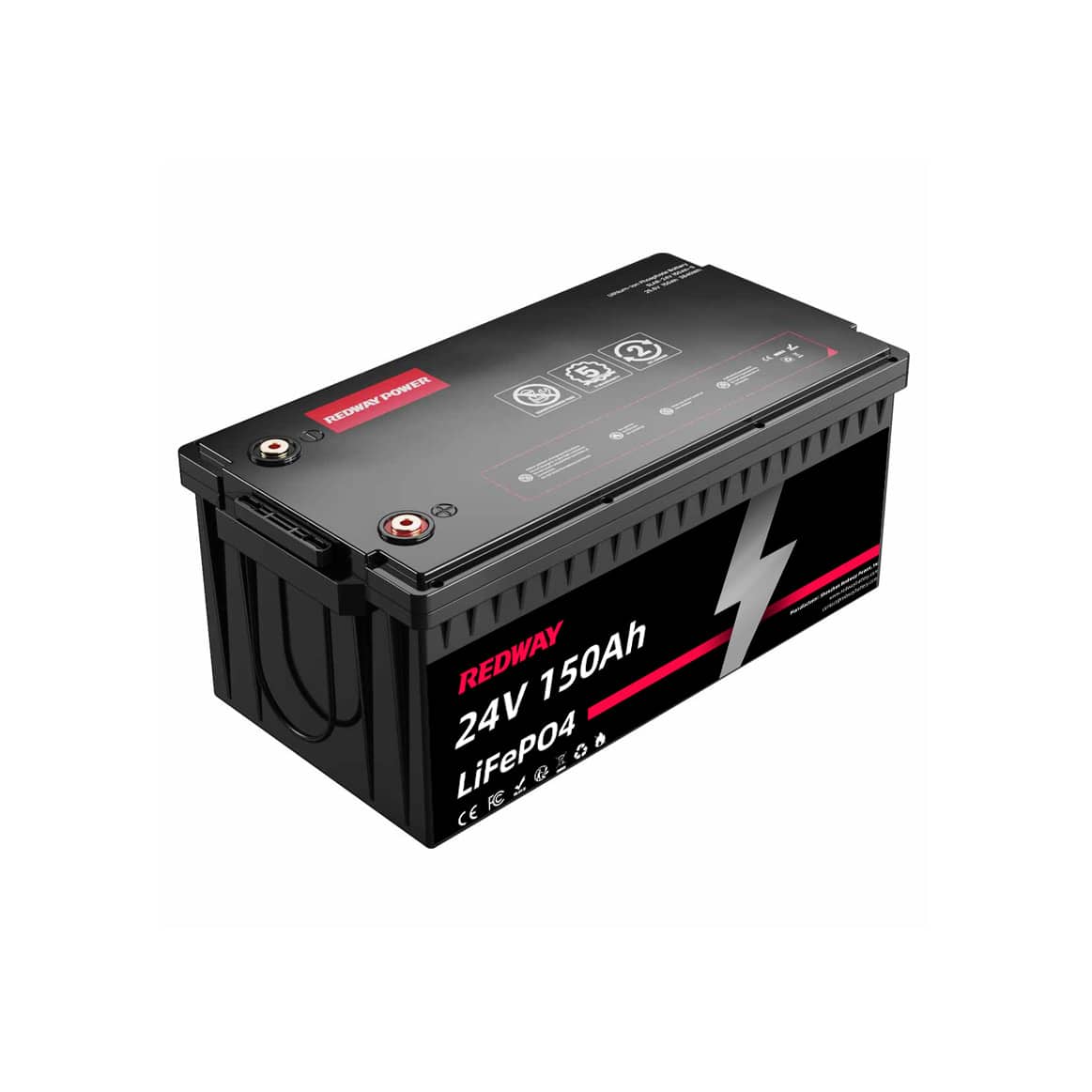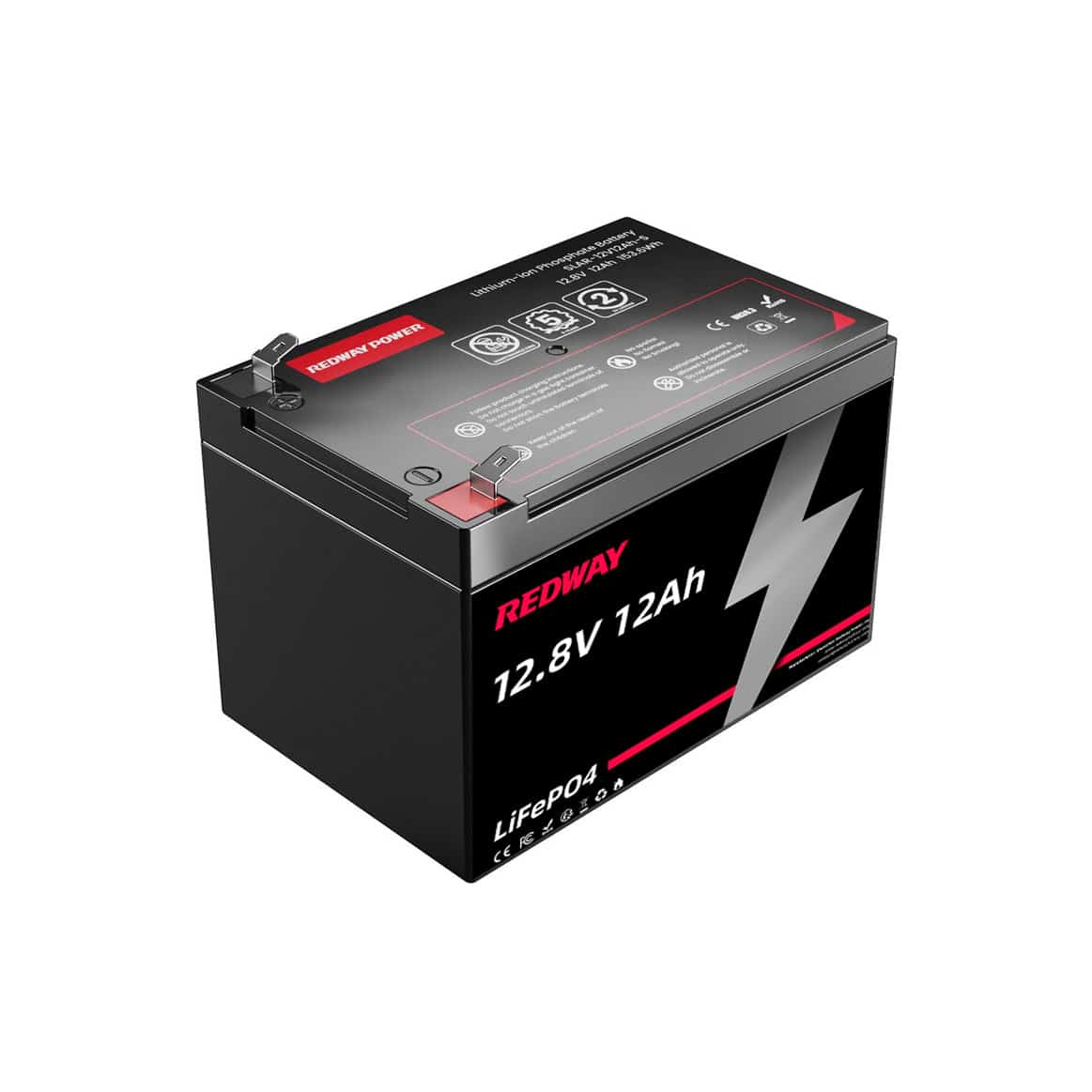Description
The Redway 12V 120Ah LiFePO4 lithium battery offers a robust and efficient energy solution designed for various applications including solar energy storage, electric vehicles, marine systems, and backup power. With a nominal voltage of 12.8V and a capacity of 120Ah, it delivers a substantial 1536Wh of clean, reliable power.
Constructed with high-quality LiFePO4 (Lithium Iron Phosphate) cells, this battery guarantees an impressive cycle life of over 5000 cycles at 80% depth of discharge, making it a cost-effective, long-lasting alternative to traditional lead-acid batteries. The battery supports a maximum continuous charge and discharge current of 100A, ensuring efficient energy delivery for high-demand usage.
Measuring 330 x 172 x 215 mm and weighing only 10.5 kg (23 lbs), the compact and lightweight design facilitates easy installation and portability. Its IP65 rating protects against dust and water, enhancing durability in challenging environments. Integrated with a reliable JBD/DALY BMS, the battery offers full protection from overcharge, over-discharge, short circuit, and temperature extremes.
Additional optional upgrades like Bluetooth, GPS, LCD displays, and active balancing provide smart monitoring and control capabilities. Certified to UL1642, IEC62619, CE, and UN38.3, this battery features a 10-year design life and a 3-year warranty, making it a safe and efficient power solution for a wide range of energy needs.
Know More
Why Choose a 12V 120Ah Factory LiFePO4 Lithium Battery (BCI Group 31) for Your Energy Needs?
A 12V 120Ah LiFePO4 lithium battery in BCI Group 31 size delivers long cycle life, high energy density, and robust safety for marine, RV, solar, and industrial applications. Redway Battery leads with OEM/ODM options, advanced BMS, and global certifications, making it the trusted choice for B2B, wholesale, and demanding power users.
What are the main features of a 12V 120Ah LiFePO4 lithium battery (BCI Group 31)?
A 12V 120Ah LiFePO4 battery offers 1.5kWh of usable energy, 4000–6000+ cycles, and a lightweight, maintenance-free design. Built to BCI Group 31 standards, it fits seamlessly into existing systems. Redway Battery’s models include a smart BMS, IP65/IP67 waterproofing, and OEM/ODM customization for terminals, communication, and branding.
Chart: 12V 120Ah LiFePO4 BCI Group 31 Battery Key Specs
| Feature |
Value |
| Nominal Voltage |
12.8V |
| Capacity |
120Ah |
| Energy |
1.54kWh |
| Cycle Life |
4000–6000+ |
| Weight |
13–14.5kg |
| Dimensions |
~330×173×220mm |
| BCI Group |
31 |
| BMS |
Smart (100A/150A) |
| Waterproof |
IP65–IP67 |
| Certifications |
UL, CE, UN38.3, IEC |
| Warranty |
5–10 years |
How does a 12V 120Ah LiFePO4 battery compare to AGM and lead-acid batteries?
LiFePO4 batteries offer 5–10 times the cycle life, 60% lighter weight, and 99% usable capacity compared to AGM or lead-acid. They deliver consistent voltage, rapid charging, and require no maintenance. Redway Battery’s LiFePO4 solutions outperform traditional batteries in efficiency, safety, and total cost of ownership.
Why is a smart BMS essential for 12V 120Ah LiFePO4 batteries?
A smart BMS protects against overcharge, over-discharge, overheating, and short circuits. Redway Battery’s BMS options include Bluetooth, CAN, and RS485, enabling real-time monitoring, remote diagnostics, and seamless integration with solar, marine, and RV systems. This ensures maximum safety, reliability, and long-term performance.
What applications are ideal for a 12V 120Ah LiFePO4 BCI Group 31 battery?
These batteries are perfect for RVs, boats, marine trolling motors, solar energy storage, off-grid cabins, backup UPS, and industrial equipment. Their compact BCI Group 31 footprint, high output, and deep cycling make them ideal for both mobile and stationary power needs.
How customizable are 12V 120Ah LiFePO4 batteries for OEM/ODM buyers?
Redway Battery offers full OEM/ODM customization—capacity, voltage, BMS features, shell material, and communication protocols can be tailored. MOQ starts at 10–50 units, with delivery in 20 days. Branding, color, terminals, and communication upgrades are available for seamless integration and private labeling.
What certifications and quality standards do these batteries meet?
Redway Battery’s 12V 120Ah LiFePO4 batteries are certified to UL, CE, UN38.3, IEC, and ISO9001 standards. IP65/IP67 waterproofing ensures durability in harsh environments. Rigorous QC and traceability guarantee reliability for global B2B and OEM clients.
Chart: Certifications and Standards
| Certification |
Coverage |
| UL |
Cell/Battery Safety |
| CE |
European Safety/EMC |
| UN38.3 |
Lithium Transport |
| IEC |
Battery Safety |
| ISO9001 |
Factory Quality |
How do OEM factories like Redway Battery support B2B and wholesale buyers?
Redway Battery provides engineering support, fast prototyping, and flexible pricing. Their Dongguan factory offers rapid turnaround, global shipping (FOB, EXW, CIF), and payment options (T/T, L/C, PayPal). Technical support and after-sales service ensure smooth integration and satisfaction.
What is the price range and delivery time for wholesale 12V 120Ah LiFePO4 batteries?
Bulk pricing ranges from $250 to $500 per unit, depending on quantity and customization. Redway Battery’s MOQ is 10–50 units, with typical delivery in 20 days. Discounts are available for large orders, and shipping options include sea, air, and land for global reach.
Can 12V 120Ah LiFePO4 batteries be integrated with smart monitoring and IoT systems?
Yes, Redway Battery’s OEM solutions support Bluetooth, WiFi, CAN, and RS485 for remote monitoring and IoT integration. Optional LCD/LED displays and app connectivity enable real-time diagnostics, predictive maintenance, and remote management—ideal for advanced solar, marine, and RV deployments.
Redway Battery Expert Views
“Redway Battery’s 12V 120Ah LiFePO4 BCI Group 31 battery is engineered for reliability, safety, and adaptability. Our OEM/ODM services empower clients to innovate in marine, RV, and solar energy. With advanced BMS, global certifications, and rapid delivery, we ensure every project achieves maximum performance and satisfaction.”
Conclusion
A 12V 120Ah LiFePO4 lithium battery in BCI Group 31 size from a factory like Redway Battery delivers unmatched safety, longevity, and flexibility for B2B and wholesale applications. With advanced BMS, global certifications, and custom engineering, these batteries drive innovation in marine, RV, and backup power—delivering reliable, scalable, and future-ready energy.
FAQs
What is the cycle life of a 12V 120Ah LiFePO4 battery?
Most deliver 4000–6000+ cycles at 80% DOD, lasting 10 years or more in typical use.
Can I customize the battery for my application?
Yes, Redway Battery offers OEM/ODM customization for voltage, capacity, BMS, and communication protocols.
What certifications do these batteries have?
UL, CE, UN38.3, IEC, and ISO9001 ensure global safety and quality compliance.
What is the MOQ and delivery time for wholesale orders?
MOQ is 10–50 units, with delivery in 20 days and global shipping options.
Are these batteries compatible with marine, RV, and solar systems?
Absolutely, they integrate seamlessly with solar inverters, marine electronics, and RV power systems.



